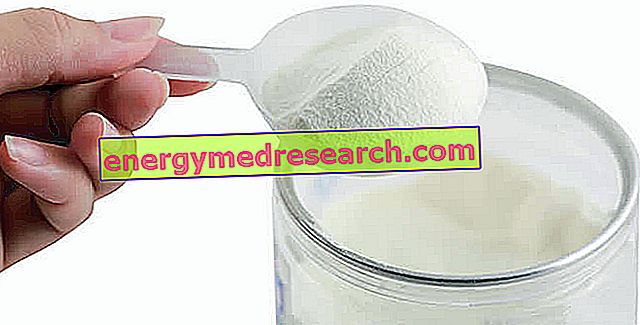Generality
In general, hydrolyzed collagen means enzymatically or chemically processed collagen to obtain smaller sized fragments. This characteristic allows to obtain more advantageous products from the pharmacokinetic point of view, since they are characterized by an easier digestion and solubility in water.
The peptides contained in the hydrolyzed collagen, rich in amino acids such as glycine, L-proline and L hydroxyproline, according to some authors could help the fibroblasts in the synthesis of endogenous collagen.

Indications
Why is hydrolyzed collagen used? What is it for?
The main field of application of hydrolyzed collagen is orthopedic.
According to several authors, in fact, hydrolyzed collagen - especially if taken together with other molecules, such as Glucosamine or Chondroitin sulfate - could have an anti-arthritic activity, valuable in the course of inflammatory and degenerative joint diseases such as osteoarthritis.
Hydrolyzed collagen could provide the substrates necessary for the synthesis of new collagen, safeguarding the functional and structural integrity of the joint.
However, the very slow absorption kinetics and the impossibility of specifically targeting the amino acids derived from the digestion of hydrolyzed collagen towards the synthesis of new collagen, would greatly reduce its real effectiveness.
The supposed antiaging activities are still to be clarified.
Property and Effectiveness
What benefit has hydrolyzed collagen shown during the studies?
Preliminary evidence would suggest the efficacy of hydrolyzed collagen in preventing aging and joint degeneration.
More precisely, a very recent clinical trial would have demonstrated the usefulness of hydrolyzed collagen - taken for 24 weeks in doses of 10 g daily - in reducing joint pain in athletes subjected to intense training.
Studies, this time experimental, would instead support the efficacy of hydrolyzed collagen in reducing the histological and functional damage of ethanol on the gastric mucosa.
Doses and method of use
How to use hydrolyzed collagen
Classically, hydrolyzed collagen is found in the form of a powder, which can be taken as such or in association with other molecules, such as glucosamine or chondroitin sulfate.
Regarding the maintenance of good joint health, the currently published studies suggest doses of hydrolyzed collagen of between 7 and 10 g per day.
Despite the absence of significant scientific evidence, hydrolyzed collagen is now used, with conflicting opinions, in the antiaging and cosmetic field, as a remedy capable of preserving the functional and structural integrity of the dermis. In this sector the use of hydrolyzed collagen refers mostly to topical or oral use, combined with antioxidants such as vitamin C, to other amino acids such as arginine, hydroxyproline or ornithine or biologically active molecules like Centella asiatica. One of the best-selling supplements based on hydrolyzed collagen is the X115 + Plus New Generation Skin Care supplement.
Definitely less important, given the low biological value of this protein, is the use of hydrolyzed collagen supplements as a nutritional protein supplement.
Side effects
Apart from rare cases of hypersensitivity reactions, the use of hydrolyzed collagen has generally proved to be safe and free of clinically relevant side effects.
The animal origin of collagen, however, raises many doubts about its healthiness, in particular as regards the transmission of TSE-BSE (transmissible spongiform encephalopathies, among which the mad cow disease stands out for its reputation).
In theory, the processes of heating, filtration and alkalisation of animal remains should be effective in eliminating, or at least reducing, the levels of infectious agents (prions) that transmit TSEs.
For this reason, generally, it is preferred to give space to collagen of fish origin (marine collagen), for which the aforesaid risk is absent.
Contraindications
When should hydrolyzed collagen not be used?
The use of hydrolyzed collagen is contraindicated in case of hypersensitivity to the active ingredient.
Pharmacological Interactions
What drugs or foods can modify the effect of hydrolyzed collagen?
The only pharmacological interaction of the currently characterized and noteworthy hydrolyzed collagen would be the one with Calcitonin.
In particular, the association with hydrolyzed collagen would be responsible for a potentially therapeutic effect of this hormone during osteoporosis.
Precautions for use
What do you need to know before taking hydrolyzed collagen?
The use of hydrolyzed collagen supplements should be avoided, given the absence of studies in this regard, during pregnancy and in the subsequent period of breastfeeding.
The same precautions should be taken in case of renal failure or severe nephropathy.
It is also recommended to carefully evaluate the origin of extraction of hydrolyzed collagen, avoiding supplements derived from parts of the bovine nervous system, potentially at risk of infectious diseases.
Safer from a microbiological point of view, hydrolyzed collagen is extracted from bovine skin and bones.



